|
|
|
Sort Order |
|
|
|
Items / Page
|
|
|
|
|
|
|
| Srl | Item |
| 1 |
ID:
125567
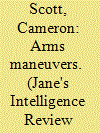

|
|
|
|
|
| Publication |
2013.
|
| Summary/Abstract |
The overthrow of Libyan leader Muammar Ghadaffi in 2011 prompted a flood of weapons into north Africa and the Middle East. Cameron Scott investigates the rise of illicit arms trafficking and its effects on regional stability.
|
|
|
|
|
|
|
|
|
|
|
|
|
|
|
|
| 2 |
ID:
131665
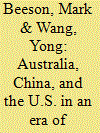

|
|
|
|
|
| Publication |
2014.
|
| Summary/Abstract |
Tensions in the Asia-Pacific region are rising as a consequence of the U.S. "pivot" to Asia and China's increasingly assertive foreign policy. Other states in the region must try to reconcile potentially conflicting economic and strategic imperatives as a consequence. Australia illustrates these dilemmas. We ask what role regional institutions can play.
|
|
|
|
|
|
|
|
|
|
|
|
|
|
|
|
| 3 |
ID:
131843


|
|
|
|
|
| Publication |
2014.
|
| Summary/Abstract |
As relations between Japan and China change due to a paradigm shift that has occurred over the past few years, the need for a new security outlook and world view has emerged. In East Asia, the foundation for the relationship between Japan and China must be fairness and justice, and the rule of law. This article proposes ways that Japan and China can work to cultivate common ground that would bring forth the possibility of a new Japan-China relationship based on the "strategic reciprocal relationship" established in 2006.
|
|
|
|
|
|
|
|
|
|
|
|
|
|
|
|
| 4 |
ID:
008334
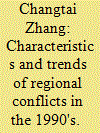

|
|
|
|
|
| Publication |
June 1995.
|
| Description |
12-17
|
|
|
|
|
|
|
|
|
|
|
|
|
|
|
|
| 5 |
ID:
129741
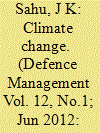

|
|
|
| 6 |
ID:
131846
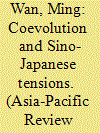

|
|
|
|
|
| Publication |
2014.
|
| Summary/Abstract |
Unlike those who blame the other side or structural forces beyond one's control for the current Sino-Japanese tensions, this paper offers a theoretical insight about the coevolution between China and Japan to explain why the two Asian great powers that had a better relationship in the past are now experiencing greater tensions when their much closer economic and people-to-people ties should facilitate greater cooperation. The two nations have coevolved over millennia with increasing intensity over time. They avoided serious tensions in the 1970s-1990s partly thanks to each being situated in a different niche. But that separation has diminished in a globalizing world and the two countries are becoming more integrated, which has triggered a backlash. The earlier generation of proponents of Sino-Japanese friendship succeeded in forging strong economic and social ties, but the current generation finds it difficult politically and psychologically to manage the new reality in their relations.
|
|
|
|
|
|
|
|
|
|
|
|
|
|
|
|
| 7 |
ID:
128395
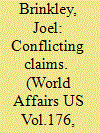

|
|
|
|
|
| Publication |
2014.
|
| Summary/Abstract |
Most everyone has heard of the South China Sea debate, the enduring argument between China and most every other state that has a coastline on that waterway. From Indonesia to the Philippines, every state is angry with China over its claim that it maintains full ownership rights to nearly all of the sea's islands and resources.
|
|
|
|
|
|
|
|
|
|
|
|
|
|
|
|
| 8 |
ID:
131386
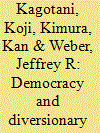

|
|
|
|
|
| Publication |
2014.
|
| Summary/Abstract |
Since its democratization, South Korea's foreign relations with Japan have become increasingly volatile. We investigate the diversionary incentives behind these fluctuations in South Korean foreign policy during 1988-2011. We show evidence that, similar to mature democracies, economic turmoil is driving Korean leaders to divert the public attention toward low-intensity disputes against Japan. However, unlike mature democracies, our results reveal that public approval ratings and national elections do not encourage leaders to engage in the diversionary behavior due to South Korean domestic political institutional settings and party system. These findings highlight challenges to foreign policy making in a new democracy, an issue that has not been considered in detail in the literature. We conclude that although historical antagonism and US commitment to East Asia may affect the Japan-South Korea relationship, economic diversionary incentives significantly determine the fluctuations in Japan-South Korea disputes.
|
|
|
|
|
|
|
|
|
|
|
|
|
|
|
|
| 9 |
ID:
005884
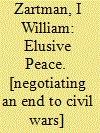

|
|
|
|
|
| Publication |
Washington DC, The Brookings Institution, 1995.
|
| Description |
xvii, 353p.
|
| Standard Number |
0-8157-9703-6
|
|
|
|
|
|
|
|
|
|
|
|
Copies: C:1/I:0,R:0,Q:0
Circulation
| Accession# | Call# | Current Location | Status | Policy | Location |
| 037292 | 303.64/ZAR 037292 | Main | On Shelf | General | |
|
|
|
|
| 10 |
ID:
017239
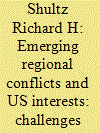

|
|
|
|
|
| Publication |
Jan -March 1994.
|
| Description |
1-22
|
|
|
|
|
|
|
|
|
|
|
|
|
|
|
|
| 11 |
ID:
148237
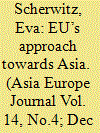

|
|
|
|
|
| Summary/Abstract |
Within the context of EU-Asia relations, the EU has tried to export its regional integration model for decades. As regards this, the ASEAN has been the natural partner of the EU. This article gives an overview on how the EU has linked its regional integration efforts with the intention of transforming regional conflicts in the (East) Asian region in the past and today. It shows that the EU has in the past relied on active model setting and positioning in order to “export” its regional integration approach. Recent developments, however, show that this approach has been abandoned. Although there has been a recent increase in EU policy papers on the region, the EU is currently embracing a rather soft approach based on socialization efforts when it comes to East Asian conflict issues. The paper concludes by stating that this is both the result of a cautious EU “shying away” from adopting any precise position on pressing Asian security issues and of an adaptation of the EU approach towards a more modest modus operandi of mutual “sharing of experiences and best practices.”
|
|
|
|
|
|
|
|
|
|
|
|
|
|
|
|
| 12 |
ID:
006258
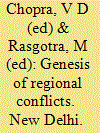

|
|
|
|
|
| Publication |
New Delhi, Gian Publication, 1995.
|
| Description |
xvi, 316p.
|
| Standard Number |
8121205026
|
|
|
|
|
|
|
|
|
|
|
|
Copies: C:1/I:0,R:0,Q:0
Circulation
| Accession# | Call# | Current Location | Status | Policy | Location |
| 037688 | 303.6/CHO 037688 | Main | On Shelf | General | |
|
|
|
|
| 13 |
ID:
095161
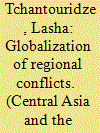

|
|
|
|
|
| Publication |
2009.
|
| Summary/Abstract |
Globalization in international relations is perhaps best understood in terms of increased interdependence in the international system. This interdependence manifests itself in both economic and military affairs. Since World War II, the United States has been the leading force behind "globalizing" processes: as economic interdependence leads toward more open markets, and military interdependence makes global affairs more peaceful, it has been in the vital interest of Washington to rid the world of isolationist and militarily autarkic powers.
|
|
|
|
|
|
|
|
|
|
|
|
|
|
|
|
| 14 |
ID:
132414
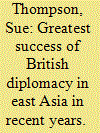

|
|
|
|
|
| Publication |
2014.
|
| Summary/Abstract |
Arthur de la Mare, an under-secretary of state at the British Foreign Office, wrote in 1967 that the ending of the Malaysia-Indonesia Confrontation of 1963-1966 was "the greatest success of British diplomacy in East Asia in recent years." However, historians generally believe British influence in the process to end this conflict was extremely limited, as it has been widely accepted that this conflict ended through bilateral negotiations between Jakarta and Kuala Lumpur. On one level, this view is accurate, but "Confrontation" took months to end and, during this process, British, American, and Malaysian officials hoped to encourage a change in leadership in Jakarta and an eventual end to the conflict. Confrontation was an anti-colonial and a regional dispute greatly affected by the Cold War environment in Southeast Asia and, therefore, not immune from international events or actors, especially the final phase of the conflict
|
|
|
|
|
|
|
|
|
|
|
|
|
|
|
|
| 15 |
ID:
192492


|
|
|
|
|
| Summary/Abstract |
Warfighting in Ukraine in 2022-2023 has become the first large-scale armed
conflict in Europe in the 21st century that directly involves Russia and
NATO. The scale of events, the geography of operations, the number of
weapons used and the personnel engaged require a reassessment of military
development and defense spending priorities in many countries around the
world. This article analyzes certain features of the current armed conflict
and the decisions already made by individual countries. The authors come
to the conclusion that given the scale of military buildup in Europe and
elsewhere it is advisable to think about new measures to reduce risks now
and establish effective arms control in the future.
|
|
|
|
|
|
|
|
|
|
|
|
|
|
|
|
| 16 |
ID:
131847
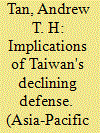

|
|
|
|
|
| Publication |
2014.
|
| Summary/Abstract |
Taiwan's declining defense capability has increasingly tilted the balance of power in the Taiwan Strait towards China. While the current status quo suits Taiwan's domestic political realities and postpones the Taiwan question to the future, its declining defense capabilities vis-à-vis China hold important implications for Taiwan. They include the reduction of its political bargaining power with China, the undermining of stability in the Taiwan Strait as China increasingly has a viable military option, and ultimately decreases the probability that the status quo can be maintained. Left unattended, Taiwan's declining defense capabilities narrow Taiwan's options and could lead to unpalatable outcomes, including sudden crisis and conflict, and the ultimate resolution of the Taiwan problem on China's terms.
|
|
|
|
|
|
|
|
|
|
|
|
|
|
|
|
| 17 |
ID:
139360
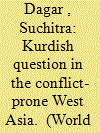

|
|
|
|
|
| Summary/Abstract |
No other region in the world has seen as much violence, physical destruction and civilian casualties, internal displacement of population, militarization of society and enduring psycho-social trauma in the past decade as West Asia. With the increase in the number as well as intensity of armed conflicts in the region since the US-led invasion of Iraq in March 2003, West Asia remains the locus classicus of recurrent warfare.
|
|
|
|
|
|
|
|
|
|
|
|
|
|
|
|
| 18 |
ID:
132905


|
|
|
|
|
| Publication |
2014.
|
| Summary/Abstract |
Following the end of the Cold War, South Asia has been in transition in a number of ways. Based on the Kantian tripod of democracy, economic interdependence and institution, this article assesses whether liberal peace has taken root in South Asia. It concludes that although an incipient liberal order may be discerned in the region, South Asia has yet to change fundamentally to become a zone of liberal peace. Particularly the Indo-Pakistani relationship remains frosty which constrains the building of a liberal order in the region.
|
|
|
|
|
|
|
|
|
|
|
|
|
|
|
|
| 19 |
ID:
131452
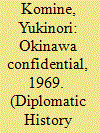

|
|
|
|
|
| Publication |
2013.
|
| Summary/Abstract |
This article demonstrates that during the 1969 Okinawa reversion negotiations, there were both secret agreements and disagreements between the U.S. and Japan regarding the conditions applied to the use of United States bases on Okinawa after reversion. The United States sought to preserve the unrestricted use of its bases on Okinawa for conventional combat operations in regional contingencies including Korea, Taiwan, and Indochina, as well as the emergency re-entry and transit rights of nuclear weapons. Due to the antinuclear public sentiment and fear of the entrapment into regional conflicts, Japan pursued the withdrawal of all nuclear weapons from Okinawa. While the United States insisted on making confidential written arrangements for the nuclear and base issues, Japan attempted to focus on public statements to explain mutual agreements but provided verbal private assurances. In the end, the United States and Japan agreed to maintain U.S. base functions for the continued U.S. deterrent capabilities in East Asia.
|
|
|
|
|
|
|
|
|
|
|
|
|
|
|
|
| 20 |
ID:
131880
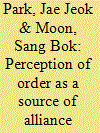

|
|
|
|
|
| Publication |
2014.
|
| Summary/Abstract |
The level of alliance cohesion is affected by the shift of attitudinal aspects (such as homogeneity in goals and threat perceptions) and behavioural aspects (such as strategic compatibility, command structure and defence burden-sharing) of alliance operation. In particular, a clear threat perception tends to make an alliance cohesive, as it suppresses (potential) disputes over the behavioural aspects of alliance operation. This article argues, however, that it is not sufficient to evaluate whether an alliance is cohesive or not only by looking at how these attitudinal and behavioural indicators have changed over time. If it were sufficient to do so, it would be supposed that the level of alliance cohesion would be bound to become lower with a change of government from conservative political forces to liberal ones in cases such as those of the US-ROK and the US-Japan alliances. We argue that the list of indicators for alliance cohesion should include not only attitudinal and behavioural aspects of alliance operation, but also functional aspects. While serving its primary purpose of responding to a specific threat, an alliance incurs an additional function of serving to maintain or to build a favourable regional order that is appreciated by both liberal and conservative governments. The interests in relation to order-building and order-maintenance motivate allies to invest for the alliance, often at their own political risk, even while they are engaged in contentious negotiations with the United States over attitudinal and behavioural aspects of alliance operations. Such investments can be considered as a different type of alliance burden sharing than has heretofore been given adequate attention. The investments indeed consolidate the alliance, paving the way for further upgrading of the alliance as conditions warrant.
|
|
|
|
|
|
|
|
|
|
|
|
|
|
|
|
|
|
|
|
|